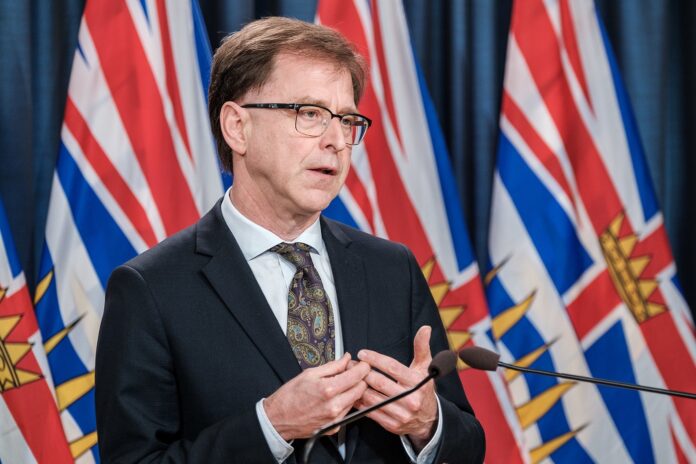VIRTUAL health visits are not new to British Columbia, but once the COVID-19 pandemic hit, the number of virtual visits by video shot up from 1,500 to 20,000 per week. The province has reached an impressive milestone: more than one million virtual health visits, according to the Provincial Health Services Authority (PHSA).
In a recent survey conducted by PHSA and its partners, patients gave virtual visits high praise. Patients felt that virtual visits by video made it easier and faster to access care, allowed the inclusion of family members, and saved them travel time and travel costs.
“The transformation in health care delivery in B.C. is remarkable. Virtual visits have become essential for delivering care to patients to keep them safe and healthy at home during COVID-19,” said Adrian Dix, Minister of Health, on Monday. “Beyond the pandemic, virtual visits will continue to be available to B.C. citizens as virtual health evolves in innovative and new ways.”
Based on a recent analysis, it is estimated that the one million virtual visits by video have saved patients in B.C. over 800,000 hours of travel time, over 22,000,000 kilometers traveled, and reduced the carbon footprint of our health care system by an estimated 8,000 tons.
For health care providers, the experience of offering virtual visits by video to patients was also positive. Over 90 per cent of surveyed health care providers felt video visits were an effective way to deliver care during a pandemic, that they could effectively communicate with patients, and that they would continue to use video visits in the future.
“A key to having these virtual visits available to patients and families is the collaboration of leaders across the B.C. health sector who, in the early days of the pandemic, embarked on a provincially coordinated response,’ said David Byres, interim president and CEO of PHSA. “Their partnership inspired innovative and effective ways to keep providing access to high quality care.”
New measures were put in place to enable virtual primary care in B.C. communities, which included issuing Zoom licences to physicians so they could deliver care virtually, and adjusting telehealth fee codes to allow physicians to bill Medical Services Plan for care services that would otherwise have been delivered in-person.
For the Palmers and the Juttens, two B.C. families living outside the Lower Mainland, virtual health has been a game changer for their children’s health care needs.
“I felt like we lived at BC Children’s prior to the pandemic, honestly. [Video visits] have reduced our daughter’s stress one hundred per cent because she doesn’t have to travel,” said Christina Palmer, mother of Charlotte, a BC Children’s Hospital patient. “I’m very thankful that we have the opportunity to do the virtual appointments and we would continue virtual care in a heartbeat. We get the same level of care for Charlotte’s treatment that we would in person but we save a 14-hour round trip drive.”
Both families have children who are under the age of 10 and live with rare conditions that suppress their immune systems. The stress of traveling from their communities to BC Children’s Hospital for checkups exacerbated their symptoms. Being able to have checkups virtually from home has significantly reduced the children’s stress, and saved the families travel time and costs.
“The stress that comes with the travel to the hospital – all of Nolin’s health issues that happen during travel, the things we have to deal with when we get there – I don’t think we realized how stressful the travel was until we didn’t have to do it,” said Darlene Schopman, mother of Nolin, a BC Children’s Hospital patient. “The change to using video visits was a huge sense of relief. It also means Nolin’s Dad and I can join and be there together for many of the appointments.”
The milestone reflects data gathered from all B.C. health authorities (First Nations Health, Vancouver Coastal Health, Fraser Health, Northern Health, Island Health, Providence Health Care and Interior Health), Doctors of BC and the Rural Coordination Centre of BC (RCCbc).
Throughout the pandemic, PHSA virtual and digital health teams have collaborated with the B.C. Ministry of Health, regional health authorities, Doctors of BC, RCCbc, HealthLink BC, the BC Emergency Medicine Network and Primary Care Networks to ensure citizens of B.C. have access to virtual health to keep them safe and healthy.
Sarah Bell, Chief Operating Officer of BC Children’s Hospital and Sunny Hill Health Centre, noted: “Any type of travel with a sick child can be traumatic for the whole family. Virtual health saves that travel time, its cost, the impact it makes on the environment, and the toll it takes on a sick child as well as their support network. BC Children’s hit the ground running to provide virtual care during the pandemic and we will continue to make great strides – in virtual and in-person care – to best support our patients and their families into the future.”
Kathy Steegstra, Chief Virtual Health Officer, PHSA Office of Virtual Health, said: “In response to the urgency of COVID-19, the Office of Virtual Health joined forces with our provincial partners in an unprecedented collaboration. The result was the rapid deployment of virtual health solutions and resources — what would normally take years to accomplish was done in weeks. The B.C. health sector acted as one team with one goal which was to help our providers continue to deliver care to patients across B.C. and keep them safe. The one millionth virtual health visit in B.C. is truly an important milestone of how far we’ve come as a province.”
Dr. Matthew Chow, President, Doctors of BC, said: “The increased use of virtual visits this past year has allowed doctors to still provide timely and accessible care to patients in spite of the social restrictions in place. Virtual visits have proven to be more efficient than in-person visits in many instances – there’s no going back. But important considerations are required in navigating the road ahead to ensure that patients still receive the care they need, when they need it.”
Dr. John Pawlovich, Virtual Health Lead, Rural Coordination Centre of BC, said: “There have been few silver linings to this pandemic, but one that has emerged is the expedited rollout of Real-Time Virtual Support pathways for health care providers and patients in rural, remote, and Indigenous communities in B.C. The collaborative vision and efforts of numerous health care partners has resulted in the creation of a safety net that aims to ensure every British Columbian, no matter where they live in our province, can access timely, high-quality, compassionate health care closer to home.”
Select results of the patient virtual health survey are available in the patient survey infographic.












